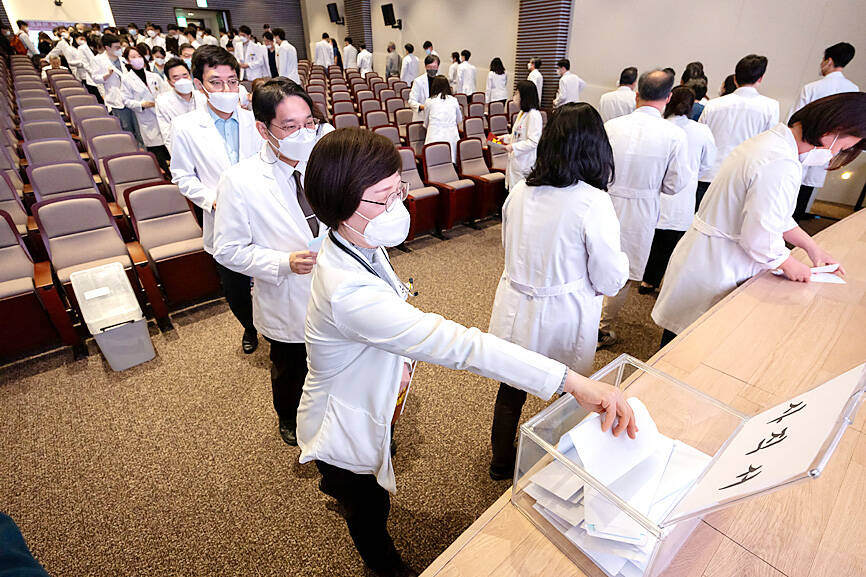Senior doctors at dozens of hospitals in South Korea planned to submit their resignations yesterday in support of medical interns and residents who have been on a strike for five weeks over the government’s push to sharply increase medical school admissions, their leader said.
The senior doctors’ action would likely not cause an immediate worsening of hospital operations in South Korea because they have said they would continue to work even after submitting their resignations, but prospects for an early end to the medical impasse were also dim, as the doctors’ planned action comes after South Korean President Yoon Suk-yeol called for talks with doctors while suggesting a possible softening of punitive steps against the striking junior doctors.
About 12,000 interns and medical residents have faced impending suspensions of their licenses over their refusal to end their strikes, which have caused hundreds of canceled surgeries and other treatments at their hospitals.

Photo: Yonhap via Reuters
They oppose the government’s plan to increase the medical school admission cap by two-thirds, saying schools cannot handle such a steep increase in students and that it would eventually hurt South Korea’s medical services, but officials say more doctors are urgently needed because South Korea has a rapidly aging population and its doctor-to-population ratio is one of the lowest in the developed world.
In a meeting with ruling party leader Han Dong-hoon on Sunday, representatives of medical professors and doctors at about 40 university hospitals — where the junior doctors work while training — expressed support for the striking doctors, saying the government’s recruitment plan “would collapse our country’s medical system,” Kim Chang-soo, head of the emergency committee at those universities, said yesterday.
Kim called Yoon’s overture a positive step, but said the standoff between doctors and the government would not be resolved unless the government rolls back its recruitment plan.
He said doctors at the universities were expected to stick to earlier plans to submit resignations voluntarily and cut back their weekly working hours to 52 — the maximum weekly number of legal working hours. Observers say senior doctors have been grappling with excessive workloads after their juniors left their hospitals.
“If the government has an intention of withdrawing its plan or has an intention of considering it, we’re ready to discuss all pending issues with the government before the public,” Kim said.
After Sunday’s meeting, Han asked Yoon’s office to “flexibly handle” the issue of planned license suspensions for the striking doctors. Yoon then asked his prime minister to pursue “a flexible measure” to resolve the dispute and seek constructive consultations with doctors, Yoon’s office said.
It was unclear whether and how soon the government and doctors would sit down for talks and reach a breakthrough. Some observers say the government’s likely softening of punishments for the striking doctors and its pursuit of dialogue with doctors were likely related to next month’s parliamentary elections, as further disruptions of hospital operations would be unhelpful for the ruling party’s candidates.
The striking junior doctors represent less than 10 percent of South Korea’s 140,000 doctors, but in some major hospitals, they account for about 30 to 40 percent of the doctors, assisting senior doctors during surgeries and dealing with inpatients while training.

‘IN A DIFFERENT PLACE’: The envoy first visited Shanghai, where he attended a Chinese basketball playoff match, and is to meet top officials in Beijing tomorrow US Secretary of State Antony Blinken yesterday arrived in China on his second visit in a year as the US ramps up pressure on its rival over its support for Russia while also seeking to manage tensions with Beijing. The US diplomat tomorrow is to meet China’s top brass in Beijing, where he is also expected to plead for restraint as Taiwan inaugurates president-elect William Lai (賴清德), and to raise US concerns on Chinese trade practices. However, Blinken is also seeking to stabilize ties, with tensions between the world’s two largest economies easing since his previous visit in June last year. At the

UNSETTLING IMAGES: The scene took place in front of TV crews covering the Trump trial, with a CNN anchor calling it an ‘emotional and unbelievably disturbing moment’ A man who doused himself in an accelerant and set himself on fire outside the courthouse where former US president Donald Trump is on trial has died, police said yesterday. The New York City Police Department (NYPD) said the man was declared dead by staff at an area hospital. The man was in Collect Pond Park at about 1:30pm on Friday when he took out pamphlets espousing conspiracy theories, tossed them around, then doused himself in an accelerant and set himself on fire, officials and witnesses said. A large number of police officers were nearby when it happened. Some officers and bystanders rushed

Beijing is continuing to commit genocide and crimes against humanity against Uyghurs and other Muslim minorities in its western Xinjiang province, U.S. Secretary of State Antony Blinken said in a report published on Monday, ahead of his planned visit to China this week. The State Department’s annual human rights report, which documents abuses recorded all over the world during the previous calendar year, repeated language from previous years on the treatment of Muslims in Xinjiang, but the publication raises the issue ahead of delicate talks, including on the war in Ukraine and global trade, between the top U.S. diplomat and Chinese

RIVER TRAGEDY: Local fishers and residents helped rescue people after the vessel capsized, while motorbike taxis evacuated some of the injured At least 58 people going to a funeral died after their overloaded river boat capsized in the Central African Republic’s (CAR) capital, Bangui, the head of civil protection said on Saturday. “We were able to extract 58 lifeless bodies,” Thomas Djimasse told Radio Guira. “We don’t know the total number of people who are underwater. According to witnesses and videos on social media, the wooden boat was carrying more than 300 people — some standing and others perched on wooden structures — when it sank on the Mpoko River on Friday. The vessel was heading to the funeral of a village chief in